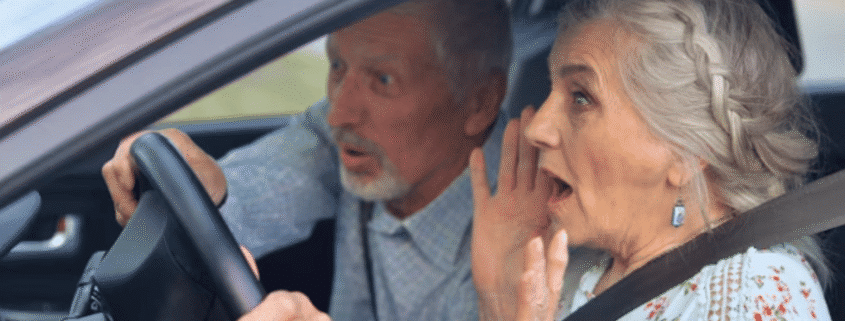A Complete Guide to Elderly Driver Car Accidents in Utah
An accident involving an older driver shakes a family. You want clear steps, not confusion. Older adults often drive safely for years, yet age brings small changes. A slower glance, a missed sign at night, or a new prescription can change what once felt routine.
When a crash happens, choices made in the first hours shape medical care and any future claims. This article explains common causes, what to do at the scene, how medicines and health play a role, and how families can protect recovery and dignity.
You will get plain steps for handling police, insurance, and bills. If legal help is needed, you will know how a lawyer can help and what to expect. We are going to guide you like a neighbor who has dealt with the same stress. It is his goal to help you leave with a clear to-do list and less worry.
Key Things to Remember
- Night driving raises risk for seniors.
- Some medicines affect alertness or balance.
- Keep photos and witness names after crashes.
- See a doctor even for minor pain.
- Save all medical bills and test results.
- Talk gently with the older driver’s family.
- Do not accept quick, low offers from insurers.
- Legal help can protect future medical needs.
- Small car changes can improve comfort and safety.
What causes most crashes with older drivers?
Many crashes stem from small limits that add up. Vision often changes first. Even a tiny blur makes reading street signs slower. At dusk, glare from headlights can startle a driver who is used to being fine. Reaction time slows with age, too. A sudden brake in front of the car leaves less time to respond.
Health conditions are part of the picture. Heart trouble, minor strokes, and memory changes can make decisions slower or confused. Then there are medicines. There are some painkillers, sleep aids, and even blood pressure medications that can make you drowsy or lightheaded.
There can be a greater effect when several drugs are mixed than if one drug is taken alone. Road factors play a role as well. Complex intersections, yield signs, and tight parking lots are harder to judge. Fatigue matters. Older drivers may tire on long trips and lose focus. Distraction is not only a young driver problem. Looking for a dropped item or checking a map can cost precious seconds. Finally, driving habits change slowly over time.
A once careful driver may begin avoiding highways but still drive at night. That small mismatch can increase risk. Spotting these causes helps families plan safer trips and reduce the chances of a crash.
Watching for signs that it is time to change driving habits
A calm conversation works better than a sudden ban. Look for small patterns first.
- Do they miss turns on familiar routes?
- Do neighbors report new curb dents or scrapes?
- What are their driving habits?
- Do they squeeze into narrow gaps or stop at intersections?
Slower reaction time, vision difficulties, or trouble judging distance may be a sign of slower reaction time. Getting lost on roads that used to be familiar is a clear red flag. Physical changes matter as well. If neck stiffness makes checking blind spots hard or arthritis limits grip, driving becomes unsafe in certain situations. Pay attention to how often friends refuse drives or the person says driving feels harder.
Open communication is helpful. Suggest that the driver take a driving evaluation at a local clinic if a friendly talk does not work.
Professionals can test reaction time and steering in a neutral way. Use a plan for gradual changes. For example, limit driving to daytime and short errands first. It is a balance of freedom and safety that is free of humiliation.
How to deal with a car crash: a step-by-step guide
Stay calm. The priority is safety. Locate a safe place where you can check for injuries. You can reach the police or medical assistance by calling 911. Getting medical care early protects your health and creates useful records. You should take pictures of the scene. Picture vehicle damage, skid marks, street signs, and the surrounding area.
At the scene, don’t apologize or make any admissions of fault. Say you are sorry someone was hurt, but avoid saying you caused the crash. Give basic facts to your insurer and answer questions honestly, but be careful with long recorded statements.
Write down how daily tasks are affected by pain or limits. This diary helps show long-term effects later if needed. If there is confusion, serious injury, or the other driver seems upset or unable to answer questions due to health, call a lawyer for guidance.
A car accident attorney in Utah can explain how to collect records and work with insurers so you focus on recovery, not paperwork.
Handling insurance and evidence after a crash with a senior driver
Insurance talk can feel like a different language. Start by filing a claim and giving basic facts. Keep calm when an adjuster calls. Do not accept a quick, low offer without comparing your real costs.
Collect everything: police report, photos, medical notes, and witness numbers. Keep repair estimates and any receipts for rides or home help. If the other driver is older, and health records may matter, let your lawyer handle requests for those records. Medical files are private and must be requested correctly.
A lawyer can also deal with complicated insurer tactics, like offers that seem fair now but do not cover long-term therapy. Keep copies of every message and letter. If your bills are piling up, tell your attorney; they can ask insurers for advanced payments or liens to cover care while the case moves. Sometimes negotiations take time.
A steady approach, with clear evidence, helps get a better outcome. If settlement talks stall, a lawyer may suggest filing a suit to preserve rights. That does not always mean a trial, but it keeps options open.
Choosing the right car accident attorney in Utah is essential for seniors
Choosing a personal lawyer is more than a name on a sign. You want someone who listens and explains things in plain words. A local attorney knows Utah rules, court timelines, and how local insurers handle cases.
If you are unsure where to start, ask about experience with older driver cases and medical records. A lawyer can help gather hospital files, bills, and witness statements. They also make sure you do not miss deadlines for filing claims. Chris Cockayne and his team at Cockayne Law help families this way.
They take time to hear what happened and then help organize records so a claim or settlement reflects real needs. As well as monitoring future expenses, a good lawyer makes sure that future needs are covered, such as home care or therapy.
An attorney puts together a simple, factual story for a judge or jury if the case goes to trial. It is important that legal help reduces stress, not increases it. It is important to ask a lawyer for a clear explanation of fees up front, as well as what the next steps will be. That way, you can focus on health and family.
FAQs
Is it always the older driver who is at fault?
Not always. Fault depends on actions at the time of the crash. Health issues can affect responsibility and compensation. Evidence like photos and witness statements matters most. A lawyer can help sort fault based on the facts.
Can I claim future medical costs after a crash?
Yes. If injuries need ongoing therapy or home help, those costs can be claimed. Keep records and notes about daily limits. A lawyer helps estimate future care and includes those needs in negotiations or court filings.
Do I need to see a doctor if I feel fine?
See a doctor anyway. Some injuries show up later, like internal bruising or whiplash. A medical record right after the crash helps link symptoms to the collision. That record also supports any insurance or legal claims.
How long do I have to file a claim in Utah?
Utah usually gives four years to file a personal injury suit. Some cases have shorter deadlines, so act sooner. Talking to a lawyer early preserves your rights and avoids surprises with timing.
How can I talk to an older driver about giving up certain drives?
Use respect and specific examples. Share close calls and suggest small limits, like no night driving. Offer rides and alternatives. Arrange a test drive with a professional if needed to keep the chat about safety, not control.
Should I give a recorded statement to the other driver’s insurance?
Be cautious. Give basic facts, but avoid long recorded statements without speaking to a lawyer. Recorded answers can be used later. Let your lawyer review before detailed or recorded chats with insurers.
How does a Utah lawyer help with a senior driver crash?
A lawyer gathers records, negotiates with insurers, and explains rights in plain terms. They include future care needs in claims and keep paperwork moving. That frees you to focus on recovery and family.









